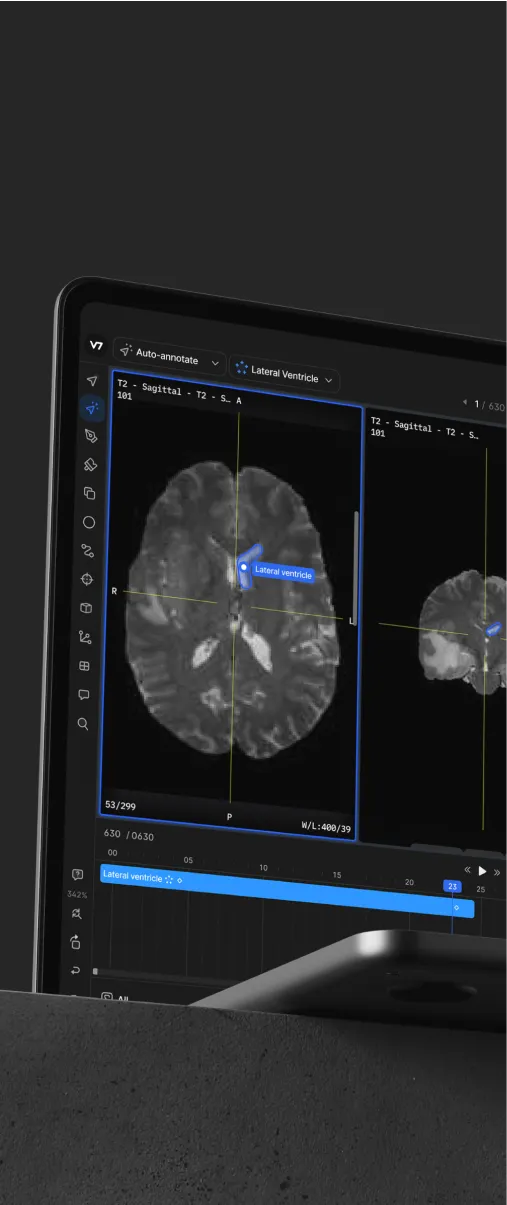Data labeling
Top 5 Dataloop Alternatives [Key Features, Use Cases]
8 min read
—
Sep 13, 2023
Searching for the perfect Dataloop replacement? We’ve got you covered. Find the right toolset for your AI product needs.

Marta Szyndlar
Content Specialist
The landscape of data management and AI product development platforms is changing faster than ever. With new technological trends, such as foundation models and LLMs, emerging, the tools keep fine-tuning or even changing their offerings only to provide the best, cutting-edge solutions.
This is a good thing for your AI products—but makes it harder than ever to keep up to date.
And in the face of the current market changes, you may be looking for a new tool to replace Dataloop in your next project.
Look no further. In this article, we listed the top five Dataloop alternatives (depending on your use case) and highlighted their key features and use cases:
V7
Labelbox
SuperAnnotate
Kili Technology
AngoAI
Without further ado—let’s roll.
Searching for an alternative to Dataloop
Dataloop is an end-to-end data operating system for A products. It covers the whole labeling process (including humans in the loop), data management, and pipeline automation, all the way to deployment.
Dataloop lets you annotate unstructured data powered with AI- and model-assisted annotations. A visualization panel makes it easier to browse through and organize your data.
The platform lets you build plugins and event-driven automation pipelines to tailor any workflow to your needs. With an API and Python SDK, you can further customize your experience.
With its support of LiDAR data annotation, high customizability, seamless data transfers, and decent security standards (including ISO/IEC/SOC2 certifications and GDPR compliance), Dataloop is a viable choice for enterprise-level customers.
However, Dataloop isn’t very practical for medical AI—it doesn’t natively support DICOM, ultrasound, or volumetric data formats, and isn’t HIPAA-compliant. Additionally, Dataloop’s integration ecosystem is not as robust as some of its competitors, and the API may not be flexible enough to cover every corner case.
So, if that’s your case and you feel like you outgrew Dataloop, let’s look at the top five competitors.
V7
V7 is a comprehensive infrastructure for AI products that covers the whole development lifecycle. The company aims to enable high-quality solutions to reach the market faster, with reduced costs and risk. Its key features include auto-labeling, dataset management, customizable workflows, and the highest security standards.
So, how does V7 stand out from the crowd?
V7’s auto-annotation tool and model-assisted labeling let the users annotate data up to ten times fastest—while maintaining maximum accuracy. V7 is highly specialized in video and medical image labeling, making it a great choice for healthcare and life sciences customers.
V7 also offers a flexible model management solution that lets you train, test, and deploy enterprise-grade models within the platform, further cutting the time between labeling and development. The production-ready models will power your AI products and streamline business operations.
V7’s custom collaborative workflows let you connect AI and human insights to build high-quality, automated MLOps pipelines. With model-assisted QA, as well as consensus and logic stages, you can achieve the highest-quality review process. All workflows are fully customizable and you can set them up with no code—or with easily manageable webhooks and API to cover any use case.
Additionally, V7 offers a document processing platform and on-demand labeling services, to ensure you’re backed on all fronts.
Key features
Flexible workflows supporting multi-stage tasks (both no-code and fully customizable setup with webhooks and API)
Medical image annotation (DICOM and NIfTI support, FDA and HIPAA compliant)
Highly specialized video annotation
Model training tool for training, fine-tuning, and deployment
Pricing
V7 offers a free plan for academic teams. For startup, business, and pro plans pricing, you can request a demo right here.
Use if
You need a platform that will cover the whole AI-product development lifecycle and you’re looking for multiple data format support (including medical or pathology images) and flexible workflows.
Labelbox

Labelbox is an end-to-end AI product-building platform that helps organizations squeeze the most out of their unstructured data.
With Labelbox, you can:
Explore and organize data through vector and AI-powered search, intelligent grouping, or few-shot learning classification for pre-labeling;
Annotate images, videos, audio, or text across different formats, supported by workflows and granular analytics to track progress, efficiency, and accuracy;
Develop, optimize, and ship models to support annotation workflows that you can connect with model training frameworks, cloud providers, or data lakes.
The platform also offers on-demand labeling services that you can test on a free trial basis.
Key features
Multiple complex data management and visualization solutions
Native annotations across multiple data formats
Advanced model development platform
Use if
You’re an enterprise customer with a lot of unstructured data that demands rigid organization—especially if you’re in the aerospace or government sector.
Pricing
Labelbox offers a free plan for individual research and small teams with a data limit. Apart from some of the premium features, the plans vary in the amount of data available to use—the site offers a calculator to estimate your starting price. If your data needs are larger, you need to contact the sales team.
SuperAnnotate

SuperAnnotate, as the company name suggests, is a labeling-focused platform that brings together an all-in-one AI data infrastructure system and annotation services.
SuperAnnotate caters to annotators, project managers, and data scientists. It’s split into two tiers:
Data Studio for annotation software and services as well as quality assurance;
ML Studio focused on data management and comprehensive MLOPs pipeline creation.
With SuperAnnote’s annotation tool, you can label images, videos, audio, text, and LiDAR. The project management platform lets you build workflows that support progress monitoring, standardized review processes, and clear analytics. The toolset also includes an LLM fine-tuning solution which includes data curation and RLHF (Reinforcement Learning from Human Feedback) capabilities.
The ML Studio covers the rest of the AI product development lifecycle. It lets the users curate and monitor data, create CI/CD pipelines with the help of webhooks and integrations, as well as train, fine-tune, and deploy models.
Superannotate’s main purpose is to provide software for data annotation and organize humans in the loop. If your goal is to build robust, complex workflows and data management pipelines or train your models entirely on the platform, look for another software.
Key features
Various data formats supported (LiDAR, PDF, or different audio formats)
On-demand labeling services
High-security standards (GDPR, HIPAA-compliant)
Pricing
Superannotate offers a free plan for early-stage startups and researchers. To learn the prices of pro and enterprise plans, you need to request a demo.
Use if
You need a data annotation tool with a simple UI and on-demand labeling services, and you don’t need to build complex MLOps pipelines on the platform.
Kili Technology

Kili Technology is a data training platform for creating DataOps pipelines that accelerate building quality AI products.
With Kili, you can annotate images, videos, text, PDF documents, satellite imagery, and conversations in their native formats—with the help of model-assisted labeling. You can also build flexible workflows with customized interfaces, validation rules, and review stages for maximum efficiency and accuracy. To monitor dataset and annotation quality, you can enhance your labeling pipeline with consensus stage and programmatic error spotting (by running custom detection models).
Kili Technology provides an API and Python SDK for connecting the tool to any ML stack, as well as options to directly integrate with your data storage of choice. The platform also offers an on-demand labeling workforce and ML expert guidance for labeling team training.
Kili Technology focuses mostly on data management and labeling. As such, the software won’t cover the entire AI product development process—you need to integrate it into your current MLOPs pipeline.
Key features
Customizable, use-case-based interfaces
Robust and flexible QA system
On-demand ML experts
Use if
You’re looking for a data management and labeling tool that lets you slice and dice your data, and you already have an existing MLOPs pipeline in place.
Pricing
Kili Technology offers a free plan for small teams. Its next subscription tier, the Grow plan, starts at $83 a month. If you’re an enterprise client, you need to contact the sales team for price estimation.
Ango Hub

Ango Hub, formerly AngoAI, is a part of the iMerit platform, which provides data annotation solutions.
Ango lets you label images, videos, text, audio, and DICOM files in native formats. You can utilize ML-assisted labeling or multiple specialized plugins to automate the labeling process partially.
The platform also lets you build simple workflows with benchmarking as well as consensus and review stages to monitor annotation accuracy. Project management is additionally supported by user role assignment, analytics panel, and real-time troubleshooting.
iMerit additionally offers on-demand labeling workforces, an issue-solving toolkit, and MLOps solutions.
Key features
Multiple data formats support, including DICOM and audio files
Flexible labeling services that can replace in-house team
Plugins that automate labeling across a few specific use cases
Use if
You’re looking for a data labeling platform (and not a complete AI product development infrastructure) that can support multiple formats at once, and you’d like to hire a labeling workforce.
Pricing
You can try out Ango Hub with a free trial. You need to request a demo from the sales team for details concerning platform capabilities and pricing.
Final words
Before you pick your alternative to Labelbox, we advise you to take a good look around and make use of the demos and trials each platform offers. Always make sure that the tool of choice can cover your specific use case—try to think of all the possible corner cases before you schedule your demo call.
And if you’re ready to check out if V7 can cover all your needs, take a look at V7 case studies to see how we already helped other businesses. Or, you can schedule a chat with the V7 customer team right away!
As a former Content Specialist in V7, Marta reported on the advancements in the AI landscape and the achievements of the V7 customers & team.







